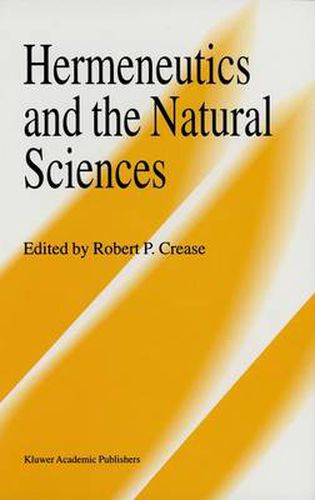Readings Newsletter
Become a Readings Member to make your shopping experience even easier.
Sign in or sign up for free!
You’re not far away from qualifying for FREE standard shipping within Australia
You’ve qualified for FREE standard shipping within Australia
The cart is loading…






This title is printed to order. This book may have been self-published. If so, we cannot guarantee the quality of the content. In the main most books will have gone through the editing process however some may not. We therefore suggest that you be aware of this before ordering this book. If in doubt check either the author or publisher’s details as we are unable to accept any returns unless they are faulty. Please contact us if you have any questions.
philosophers with both hermeneutic-phenomenological and scientific back- grounds (such as Heelan, Ihde, Theodore Kisiel, Joseph Kockelmans) have begun to read the work of Heidegger, Merleau-Ponty, Gadamer, and others as also entailing a positive re-evaluation of practices of the natural sciences. A few professional scientists with a scholarly background in hermeneutic- phenomenological philosophy (among whom is Martin Eger) have begun to do the same. A number of more mainstream philosophers of science are utilizing hermeneutical insights effectively and perceptively (Joseph Rouse), while many sociologically-trained scholars who speak with the terminolo- gy and often the assumptions of analytic philosophy reveal in their work a deep appreciation for the hermeneutical insight into the nature of his tori- cally situated knowledge (Harry Collins, Bruno Latour, Andrew Pickering, Simon Schaffer, Steve Shapin and others inftuenced by social constructivism). of these initiatives manifest the rediscovery that all dis course is situat- All ed culturally and historically. The days are gone when it could be seriously 2 debated whether a hermeneutical perspective on the natural sciences exists. The challenge remains today to understand more explicitly the hermeneutical dimension of the natural sciences in terms of an overarching hermeneutic of all knowledge.
$9.00 standard shipping within Australia
FREE standard shipping within Australia for orders over $100.00
Express & International shipping calculated at checkout
This title is printed to order. This book may have been self-published. If so, we cannot guarantee the quality of the content. In the main most books will have gone through the editing process however some may not. We therefore suggest that you be aware of this before ordering this book. If in doubt check either the author or publisher’s details as we are unable to accept any returns unless they are faulty. Please contact us if you have any questions.
philosophers with both hermeneutic-phenomenological and scientific back- grounds (such as Heelan, Ihde, Theodore Kisiel, Joseph Kockelmans) have begun to read the work of Heidegger, Merleau-Ponty, Gadamer, and others as also entailing a positive re-evaluation of practices of the natural sciences. A few professional scientists with a scholarly background in hermeneutic- phenomenological philosophy (among whom is Martin Eger) have begun to do the same. A number of more mainstream philosophers of science are utilizing hermeneutical insights effectively and perceptively (Joseph Rouse), while many sociologically-trained scholars who speak with the terminolo- gy and often the assumptions of analytic philosophy reveal in their work a deep appreciation for the hermeneutical insight into the nature of his tori- cally situated knowledge (Harry Collins, Bruno Latour, Andrew Pickering, Simon Schaffer, Steve Shapin and others inftuenced by social constructivism). of these initiatives manifest the rediscovery that all dis course is situat- All ed culturally and historically. The days are gone when it could be seriously 2 debated whether a hermeneutical perspective on the natural sciences exists. The challenge remains today to understand more explicitly the hermeneutical dimension of the natural sciences in terms of an overarching hermeneutic of all knowledge.